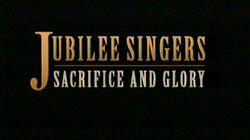Jubilee Singers: Sacrifice and Glory

On November 16, 1871, a group of unknown singers — all but two of them former slaves and many of them still in their teens -- arrived at Oberlin College in Ohio to perform before a national convention of influential ministers. After a few standard ballads, the chorus began to sing spirituals -- "Steal Away" and other songs" associated with slavery and the dark past, sacred to our parents," as soprano Ella Sheppard recalled. It was one of the first public performances of the secret music African Americans had sung in fields and behind closed doors.
"Jubilee Singers: Sacrifice and Glory," produced by Llewellyn Smith, tells the story of a group of former slaves who battled prejudice and oppression to sing their way into a nation's heart. Eventually, they would perform for presidents and queens, tour the United States and Europe, and establish songs like "Swing Low, Sweet Chariot" and "This Little Light of Mine" as a cherished part of the nation's musical heritage. The program features today's Fisk Jubilee Singers performing these and many other spirituals; Dion Graham narrates.
The concert in Oberlin was the turning point in a daring fundraising experiment for impoverished Fisk University in Nashville, Tennessee, where the singers were students. Established in January 1866, Fisk taught freed slaves how to count their wages, how to write the new names they had chosen for themselves, and read both the ballot and the Bible. Despite emancipation, the South was a dangerous place: Fisk students who dared teach in the countryside were routinely assaulted and whipped by Ku Klux Klan nightriders; one was shot at in his classroom; another had her school building burned to the ground.
Charged with keeping the financially troubled school afloat, treasurer George Leonard White proposed taking Fisk's most gifted singers on a fundraising tour of the North. Before they even left town, they encountered resistance: the parents were afraid to let their children go; White's fellow teachers opposed the tour; and the American Missionary Association, the northern religious organization that operated Fisk, refused to help, worried that the chorus's appeal for funds would jeopardize their own fundraising activities. But White persevered.
Following the path of the Underground Railway, the group made its debut in Cincinnati. Despite the warm reception, donations totaled less than $50. Night after night, it was the same: crowds loved their singing, but the collection plate yielded barely enough to cover their expenses. Yet, no one turned back.
Life on the road took its toll. White and the singers endured rheumatism, bronchitis, chronic coughs. Their clothes ran to rags. But after the triumphant Oberlin performance, word started to spread. In December, the Jubilee Singers appeared at Henry Ward Beecher's weekly prayer meeting at Brooklyn's Plymouth Church. "Every church wanted the Jubilee Singers from that time on," wrote Maggie Porter. They sang for Mark Twain, President Ulysses S. Grant, congressmen, diplomats.
After less than two weeks' rest, the singers were back on the road, touring the Eastern United States. Eventually, they would tour Europe to universal acclaim and sing for the royal families of Holland, Germany, and Britain.
The group raised what today would be millions of dollars, but they paid a terrible price. Worn down by the relentless schedule, an advance man suffered a nervous breakdown. George White lost his wife to typhoid fever. White himself nearly died of a pulmonary hemorrhage. Contralto Minnie Tate's voice was torn to shreds. Tenor Benjamin Holmes's nagging cough was caused by tuberculosis. They faced discrimination on the road and from the press. A grueling tour of Germany -- ninety-eight days, forty-one towns, sixty-eight concerts -- brought with it low morale, frayed nerves, and rivalries among the singers.
After almost seven years of touring, the Jubilee Singers returned home. Fisk honored them for raising the funds to complete Jubilee Hall and save their school.
But their contributions extended far beyond Fisk University. They had introduced the world to the power of spirituals and challenged racial stereotypes on two continents. "In their wake, hotels, railways, steamship lines, and boards of education integrated their facilities. The Jubilees not only introduced the world to the music of black America, they championed the liberties of all Americans," says Andrew Ward, co-writer of the documentary and author of "Dark Midnight When I Rise: The Story of the Jubilee Singers." More than 125 years later, the Jubilee Singers of Fisk University continue the concert tradition begun by that courageous, original chorus of former slaves.
Trailer
Recently Updated Shows

Shifting Gears
Shifting Gears centers on Matt, a stubborn, widowed owner of a classic car restoration shop. When Matt's estranged daughter and her teenage kids move into his house, the real restoration begins.

When Calls the Heart
When Calls the Heart is inspired by Janette Oke's bestselling book series about the Canadian West, the series tells the captivating story of Elizabeth Thatcher, a young teacher accustomed to her high society life, who receives her first classroom assignment in Coal Valley, a small coal mining town where life is simple, but often fraught with challenges. Upon arrival, Elizabeth befriends Abigail Stanton, a wife and mother whose husband, the foreman of the mine, along with a dozen other miners, has just been killed in an explosion. The newly widowed women find their faith is tested when they must go to work in the mines to keep a roof over their heads. Set against the wild canvas of a 19th century coal town, Elizabeth will have to learn the ways of the frontier if she wishes to thrive in the rural west on her own.

Rick and Morty
Rick is a mentally gifted, but sociopathic and alcoholic scientist and a grandfather to Morty; an awkward, impressionable, and somewhat spineless teenage boy. Rick moves into the family home of Morty, where he immediately becomes a bad influence.

The Handmaid's Tale
The Handmaid's Tale is the story of life in the dystopia of Gilead, a totalitarian society in what was formerly the United States. Facing environmental disasters and a plunging birthrate, Gilead is ruled by a twisted fundamentalism in its militarized ‘return to traditional values'. As one of the few remaining fertile women, Offred is a Handmaid in the Commander's household, one of the caste of women forced into sexual servitude as a last desperate attempt to repopulate the world. In this terrifying society, Offred must navigate between Commanders, their cruel Wives, domestic Marthas, and her fellow Handmaids – where anyone could be a spy for Gilead – all with one goal: to survive and find the daughter that was taken from her.

Wild Cards
Wild Cards follows the unlikely duo of a gruff, sardonic cop and a spirited, clever con woman. Ellis, a demoted detective, has unfortunately spent the last year on the maritime unit, while Max has been living a transient life elaborately scamming everyone she meets. But when Max gets arrested and ends up helping Ellis solve a local crime, the two are offered the opportunity to redeem themselves, with Ellis going back to detective and Max staying out of jail. The catch? They have to work together, with each using their unique skills to solve crimes. For Ellis, that means hard-boiled shoe leather police work; for Max, it means accents, schemes and generally befriending everyone in sight, while driving Ellis absolutely nuts. Against the backdrop of beautiful Vancouver — with all its unique, charming, and even contradictory neighbourhoods and subcultures — the two will have to learn what it means to trust another person and maybe actually become partners.